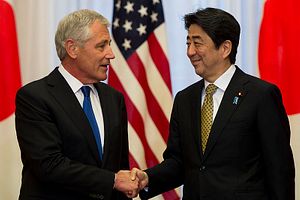The governments of Japan and the United States have decided to postpone the revision of their defense cooperation guidelines under their 1960 Treaty of Mutual Cooperation and Security. Tokyo and Washington have been negotiating a series of updates to the terms of their defense cooperation after the Japanese government under Prime Minister Shinzo Abe moved to make several changes to Japan’s defense posture, including passing a resolution reinterpreting a long-standing constitutional ban on collective self-defense. According to Japan’s Yomiuri Shimbun, the guidelines will be compiled over the first half of next year. The original deadline for revising the deadline was the end of this year.
The two countries did release an interim report, giving us a useful preview of what the updated guidelines will contain. The report (available here) noted that the new guidelines will likely emphasize:
- seamless, robust, flexible, and effective bilateral responses;
- the global nature of the Japan-U.S. Alliance;
- cooperation with other regional partners;
- synergy across the two governments’ national security policies; and
- a whole-of-government Alliance approach.
Part of the delay was likely due to Prime Minister Abe’s decision to call for snap elections in Japan. Abe’s Liberal Democratic Party and coalition partner New Komeito comfortably won those elections, taking decisive control of Japan’s House of Representatives and leaving the current prime minister in a comfortable political position for some time. This could mean that the scope of the defense guideline revisions will revolve around the assumption that Abe will stick around for at least one more year (if not four more). Abe, commonly regarded as a nationalist keen to see Japan exercise “proactive pacifism” in the Asia-Pacific, will be eager to expand his country’s share of the hardware aspect of the U.S.-Japan alliance.
While the defense cooperation guidelines are a non-binding document, they are an important signal to third parties in Asia (read: China) on how the U.S. and Japan might react to conflicts around the region. Given that the United States has said that it would come to Japan’s defense in any conflict over the Senkaku/Diaoyu Islands in the East China Sea, the updated guidelines will offer important clarifications on what the two allies will expect of one another and how they will react to crises around the region.
Domestically, despite Shinzo Abe’s election victory, his mandate remains somewhat unclear. Most analysts would agree that the decision to call snap elections was spurred by negative economic data. The elections were, in effect, a national referendum on “Abenomics.” However, Abe’s moves on defense — notably reinterpreting the constitutional ban on collective self-defense — have drawn a fair bit of domestic criticism. The LDP will submit bills concerning the collective self-defense reinterpretation to the Diet in spring 2015. That will thrust the issue back to the forefront of Japanese politics and could affect the ultimate outcome of the defense guideline revision process, possibly resulting in further delays.

































